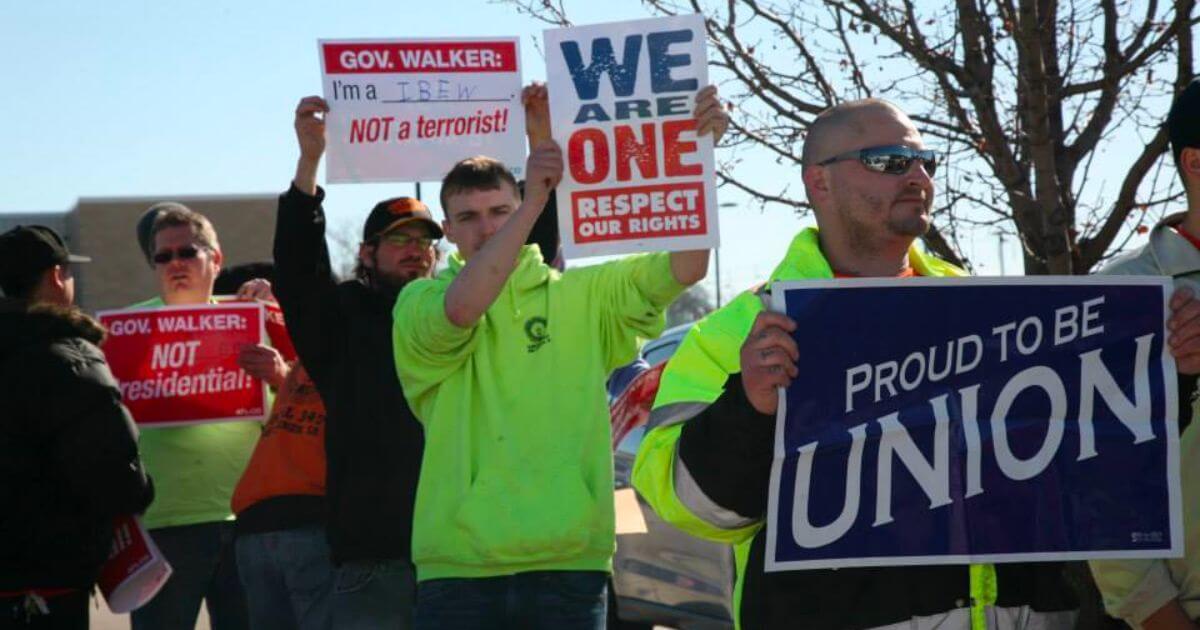
Iowa labor unions protest a 2015 visit by former Wisconsin Gov. Scott Walker/Iowa Federation of Labor photo
Nearly 180 public unions in Iowa are currently in the midst of being forced to vote on keeping their union, or else the state will take it away.
It’s called “recertification,” and it’s mandatory of certain public unions in Iowa since the Republican-majority legislature passed an anti-union law five years ago.
Changes to Chapter 20, or the collective bargaining law, reverses the way public unions normally operated in the state.
Instead of continuing along as normal, voting for or against their union only if members wanted to decertify, the new law made decertification the default, forcing union members to constantly vote to keep their union.
[inline-ad id=”1″]
Additionally, union members who do not vote are counted as “no” votes, meaning turnout is a matter of literal life or death for a union. (And the union has to pay for each arbitrary election, too.)
“It very, very much is one of the most undemocratic things you can think of,” said Charlie Wishman, president of the Iowa Federation of Labor AFL-CIO.
But how did it come to this?
[inline-ad id=”2″]
The original anti-union governor
The first domino that fell in conservative states rolling back union rights came in 2011. Republican Wisconsin Gov. Scott Walker apparently saw an opportunity to severely diminish the growing political power of unions in his state. He made Wisconsin the first state to restrict most public union bargaining rights (notably, not his favored police and fire unions).
Teachers protested en masse, knowing Walker’s ultimate goal was gutting this threat to his political power. It turned out they had reason to worry: Just four years after that vote, union membership in affected public unions in Wisconsin was cut in half.
To Republican governors, however, this looked like a great idea. More than a dozen passed similar laws in their own states in the decade since, including in Iowa.
[inline-ad id=”3″]
“It really sent a signal to other state governments across the US,” Wishman said. “It was expected of very conservative states to go after public unions.”
But that’s come at the price of quality education.
In five states (not including Iowa) that enacted restrictions in 2011 and 2012 alone, teacher salaries decreased by 5% and benefits by almost 10%, according to a 2021 report. That one policy change led to fewer teachers and worse student outcomes in those states.
Iowa joins the anti-union party
Iowa’s 2017 anti-union law was signed by then-Gov. Terry Branstad and limits the bargaining of around 180,000 public employees.
City garbage collectors, teachers, state prison workers, and more (but not police unions) could now only bargain on wages—and were barred from asking for more than 3% raises or the cost of living increase, whichever was lower.
“It’s built into the law that public employees will never, ever get a raise equal to or above inflation, no matter how good a job they do,” Wishman said.
[inline-ad id=”4″]
And though unions still recertify at high rates in Iowa, it’s more difficult to convince someone that a union can address your grievances when you’re “seeing one-page contracts,” Wishman said.
He sees two ways of fixing the problem: One way is to scrap Chapter 20 altogether, going back to how public unions were allowed to bargain prior to 2017. The second is to go beyond that, giving public union employees the same rights as private-sector employee unions have under the National Labor Relations Act.
“We need to have a massive change in both the Legislature as well as the governor if you want to see change in this,” Wishman said.
By Amie Rivers
10/19/22
[inline-ad id=”0″]
Have a story idea for me? Email amie at iowastartingline.com. I’m also available by text, WhatsApp and Signal at (319) 239-0350, or find me on Twitter, TikTok, Instagram and Facebook.
Iowa Starting Line is part of an independent news network and focuses on how state and national decisions impact Iowans’ daily lives. We rely on your financial support to keep our stories free for all to read. You can contribute to us here. Follow us on TikTok, Instagram, Facebook and Twitter.
Support Our Cause
Thank you for taking the time to read our work. Before you go, we hope you'll consider supporting our values-driven journalism, which has always strived to make clear what's really at stake for Iowans and our future.
Since day one, our goal here at Iowa Starting Line has always been to empower people across the state with fact-based news and information. We believe that when people are armed with knowledge about what's happening in their local, state, and federal governments—including who is working on their behalf and who is actively trying to block efforts aimed at improving the daily lives of Iowan families—they will be inspired to become civically engaged.


Big corporations are suing to block Biden’s efforts to lower costs
From the cost of medication to education to everyday expenses, the Biden administration has passed several laws and implemented many federal rules...

Iowa Republicans make outlawing gay marriage key 2024 campaign priority
Iowa Republicans have made outlawing gay marriage a key goal in their 2024 party platform. During the Iowa GOP’s 2024 state convention on Saturday,...

Department of Justice says Iowa immigration law violates US Constitution
If Iowa doesn’t suspend the enforcement of its new immigration law by May 7, the state could face a federal lawsuit, according to the Des Moines...

Rushing: Iowa State president said the quiet part out loud
I want to thank Iowa State University President Wendy Wintersteen for doing us all a favor by finally saying the quiet part out loud: all the...

Iowa sets aside almost $180 million for year two of voucher program
Iowa has committed nearly $180 million in taxpayer funds to support private school tuition in the 2024-25 school year, which is almost $50 million...

Kalbach: Immediate action needed on corporate ag pollution
Iowa agriculture has undergone substantial changes over the past 40 years. We see it all around us. Rather than crops and livestock being raised on...





